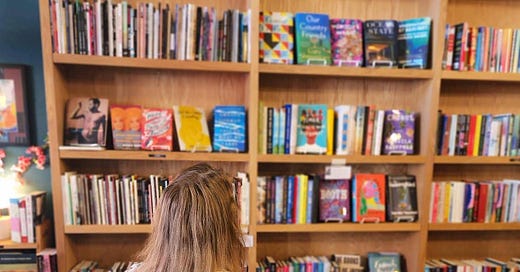I’m entering an intentional period of rest over the next couple of months. That’s not typically how it goes. My mind is usually dragged (kicking and screaming) by my body into rest by way of illness or burnout. But, I’ve been working on striking the balance this year, and it’s paid off so far. Even if it hasn’t all been rainbows and roses.
The big picture things: I’m actively rethinking my manuscript and preparing to take my Fringe show on tour next year. The immediate picture things: I’m immersing myself in reading and spending time exploring the larger KC creative scene beyond poetry. I’m going to more shows, exhibits, galas, and having fun.
Some other notes: October is my favorite month, my heart is full, and the leaves are turning. Life remains beautiful despite some poignant hardships. I took a clowning workshop and have been reading about the history of candy. This week I drove to Chicago with my best friend to see a beloved band release their first album in 12 years. (Which is why this newsletter was delayed. Oops!)
In the spirit of cultivating a creative life and filling one’s artistic cup, I thought I’d share some books that have been influential for me over the years. Several of these are touchstones for me when I feel like I’m in a creative rut or when I need a little dose of inspiration for the next season.
Have you read any of these? Or do you have similar works that you turn to? I’m literally ALWAYS down to chat books. You can drop a comment if you’re so inclined :)
I’ll be back with another Silly Things essay next month! Until then, thanks for reading <3
8 Books That Have Influenced My Work
Anne Lamott’s Bird by Bird
I was introduced to this book by a mentor when I was a teenager and it’s a staple that I return to often. I’m not unique in my love of this book, Anne Lamott’s work has influenced many writers. Part memoir, part writing advice, it’s an all-around wonderful read.
My favorite tidbit from this book is the idea of the “Shitty First Draft” and the idea that it’s ok to write badly. That’s what editing is for!
Samantha Irby’s Wow, No Thank You
I aspire to be as funny as Samantha Irby is in her writing. She is so poignant with her colorful details and I’ve loved every book of hers that I’ve read. They’re a pure joy to read, every time.
Sloane Crosley’s I Was Told There’d Be Cake
Sloane Crosley is another essayist who can make me laugh out loud. The opening essay of this collection always sticks in my mind as to how you can find material anywhere, you just have to be looking.
Rebecca Solnit’s The Faraway Nearby
I read The Faraway Nearby as part of my honors work during undergrad. I was studying Rebecca Solnit’s work as part of crafting my own collection of creative nonfiction essays. This book is gorgeous and the way she organizes the story is unique and akin to a poetry manuscript.
Fun Fact: Solnit is also the author of “Men Explain Things To Me” the origin of the term “mansplaining,” though she did not coin the phrase herself.
Hannah Gadsby’s Ten Steps to Nannette
I loved Hannah Gadsby’s Netflix specials and was really excited to read her memoir situation when it came out. Gadsby came up in the international Fringe circuit, which was fun to learn about as I was producing my first Fringe show in 2022.
Aimee Nezhukumatathill’s At The Drive-In Volcano
I first heard Aimme Nezhukumatathill on the VS Podcast and loved the poem she read at the end of her episode. I immediately picked up this book from the library. The way she uses humor and talks about everyday subjects resonates with me.
Allen Ginsberg’s Howl
I wrote my high school senior composition course thesis on Howl. I can’t quite remember how I came across it. Maybe my teacher recommended it, maybe I just saw it on that one episode of Gilmore Girls where they used it to prove Jess was an intellectual bad boy.
Allen Ginsberg is a touchstone for a lot of young poets because of his influence on American poetry and “edgy” subject matter.
A lot of people focus on Ginsberg’s use of “profane” language, but I think the influence of this poetry is more than its subject matter. The long, rambling free verse forms are evident in a lot of poetry today.
Richard Siken’s Crush
I encountered this book in my first poetry workshop in undergrad.
Side note: I love that my professor had us read living, contemporary poets during our workshop. Everyone should focus on reading living poets and not the same dead old guys over and over.
Similar to Howl, Siken’s use of language and structure spoke to me as a younger writer. It was also my first experience close reading an entire poetry collection and paying attention to how it was put together.



